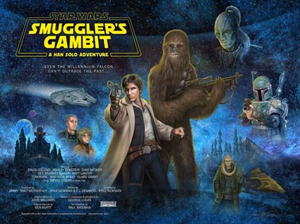“Star Wars” has a limited yet rich history in the medium of full-cast audio dramas (which I’m distinguishing here from audiobooks, which have a single reader). I know I’m not alone among fans in saying that listening to the book-and-record audio dramas is how I spent a lot of my “Star Wars”-loving childhood. The recent release of a new yarn, “Smuggler’s Gambit,” on StarWars.com has rekindled those great memories of “Star Wars” experienced by a pair of headphones and purely imagined visuals.
A list of “Star Wars” book-and-records starts with the movie adaptations: The three original films, plus “The Ewoks Join the Fight,” which expanded on the second half of “Return of the Jedi,” plus the two Ewok movies. Then there are the two Marvel comic book adaptations, “Droid World” and “Planet of the Hoojibs.”
Then there’s my personal favorite, “Rebel Mission to Ord Mantell,” a larger 33 1/3 record (the others are 45s) which doesn’t include a book but features a longer, slightly more mature story. I remember being scared of the bounty hunter Cipher when I was a kid and tensely hoping that Luke could cut his ship’s connecting cable in order to escape the stormtroopers at the story’s end. Additionally, I don’t remember being put off by Luke and Han not sounding like they did in the movies — in my memory, they did sound the same in all the record performances (or at least close enough), and that’s a credit to both the voice actors and my imagination, I suppose.
“Rebel Mission” was written by Brian Daley, who also did the three movie radio dramas, the cream of the crop in this medium of “Star Wars” entertainment. “A New Hope” and “Empire” both came out in the films’ wake in the 1980s, and “Jedi” — penned by a cancer-stricken Daley on his deathbed — completed the trilogy in 1996.
I finally shelled out the cash for these gems on cassette tape during the “Star Wars” resurgence in the ’90s, and to this day I think Daley’s 6.5-hour expansion of “A New Hope” is a treasure trove of additional scenes. It finds Mark Hamill and Anthony Daniels reprising their film roles (and Billy Dee Williams joins up for “Empire”), and some of the Leia-Vader scenes would eventually be chronicled in the “Empire” comic book, giving Daley’s work further legitimacy. Other than the scene where Han meets the bounty hunters after he shoots Greedo — which is an interesting curiosity, even though the Special Edition’s Jabba scene probably overwrites it (unless you want to imagine Han having three consecutive bounty hunter encounters) — all 13 chapters pretty much hold up as canon.
Daley’s “Empire” gives us a bit more material than the film, clocking in at five hours. “Jedi” — only slightly meatier than the film — is the weakest entry, as Hamill dropped out to be replaced by Joshua Fardon, forever to be a trivia answer on lists of people who have played Luke Skywalker (that list now includes “Clone Wars’ “ Anakin, Matt Lanter, thanks to “Smuggler’s Gambit”). One fun aspect of Daley’s “Jedi” is that Mara Jade appears in one of the Jabba’s Palace scenes.
That’s about the extent of my knowledge of “Star Wars” full-cast audio dramas, although I’ll have to eventually dip into the performances of the “Dark Empire” series, “Tales of the Jedi” and “TOTJ: Dark Lords of the Sith,” “Crimson Empire,” the “Dark Forces” trilogy, and “Nightlilly: The Lovers’ Tale” and “We Don’t Do Weddings: The Band’s Tale” (both from “Tales from the Mos Eisley Cantina”). I got some of these in a recent bulk purchase of audio dramas and audiobooks on eBay, so I have no reason to claim boredom in the foreseeable future.
The subgenre of audio dramas got an exciting, resurgent boost on Wednesday when “Smuggler’s Gambit” was released for free on StarWars.com. Clocking in at 34 minutes, this story has the most in common with “Rebel Mission to Ord Mantell” in that it doesn’t include a book, nor is it based on a book, comic book or short story, nor is it an expansion of a movie. It’s a wholly original tale written by Kyle Newman (the writer of “Fanboys” and one of the best analysts on the ForceCast’s “Clone Wars Roundtable”) and F.J. DeSanto.
Recorded in one take in front of a live audience last summer at Star Wars Celebration VI in Orlando, Fla., it’s hard to say whether “Smuggler’s Gambit” counts as official canon or if it’s just the most revered piece of fan fiction ever created. Certainly a look at the cast, which includes several “Clone Wars” actors, gives it instant credibility. The fact that Newman and DeSanto penned a yarn very much in the spirit of the post-“ANH” era also helps. (They also give a prequel nod with nice use of “Wizard!” and an Expanded Universe nod with a ship brilliantly named Idiot’s Array). Listeners are also treated to professional sound design by the ForceCast’s Jimmy McInerney, who uses John Williams music cues and Ben Burtt sound effects (Chewbacca’s growls being the most important here).
Particularly strong among the cast is David Collins as Han Solo. Harrison Ford’s voice and cadence are hard to capture perfectly, but Collins reminds me very much of the guy who voiced Han in “Rebel Mission to Ord Mantell.” (Oddly, cast lists from those book-and-records are nowhere to be found online.) The versatile Sam Witwer (Darth Maul on “The Clone Wars”) plays the best original character, Ro Kurota, who kidnaps Han and Chewie to auction them off to crime lords. It’s cool to hear Ashley Eckstein play a character other than Ahsoka Tano — here, she’s the older but more naive Ryder Thorn, an in-over-her-head sidekick to Kurota.
Dee Bradley Baker does a decent Prince Xizor and Clare Grant is a solid Princess Leia. Most off the mark is Matthew Wood as Bib Fortuna; he just doesn’t sound like the majordomo did in “Return of the Jedi.” And oddly, I didn’t care for Daniel Logan as Boba Fett here. As the young Boba Fett in the prequels and “The Clone Wars,” he’s fine, but he uses pretty much his same voice to portray what should’ve been a more cynical, more confident, more monotone Fett in “Smuggler’s Gambit.”
Overall, though, there’s a reason why “Smuggler’s Gambit” got such an enthusiastic response at “Celebration” and why it’s earning further praise now that it’s been released to the masses — it brings back the spirit of the classic Brian Daley radio dramas (I include “Ord Mantell” in that group) while also bridging a gap with “The Clone Wars” team (the narration by Tom Kane is a big reason for this). The story is short, sweet, often funny, pure “Star Wars,” and a wonderful addition to the saga’s history in the audio-drama medium.


